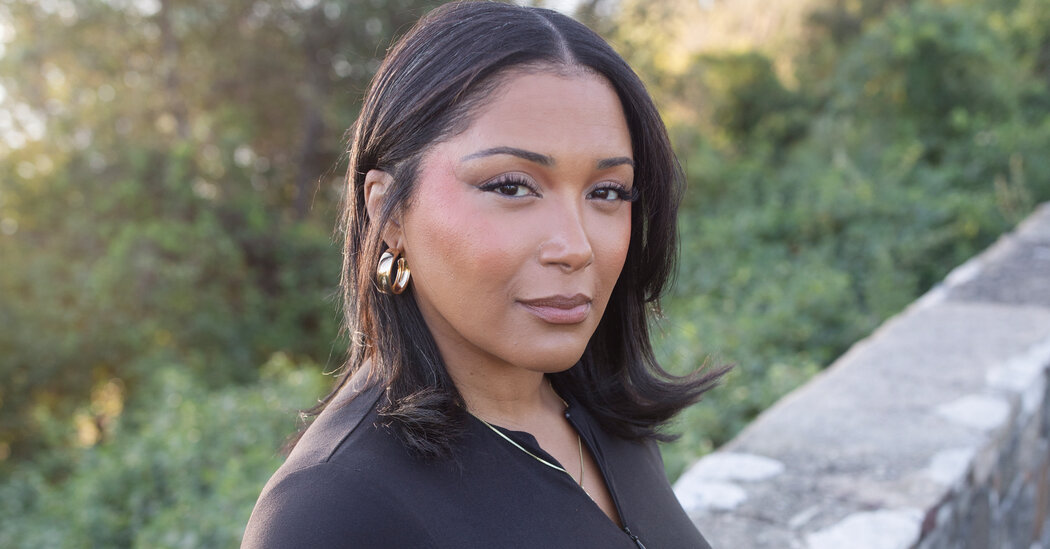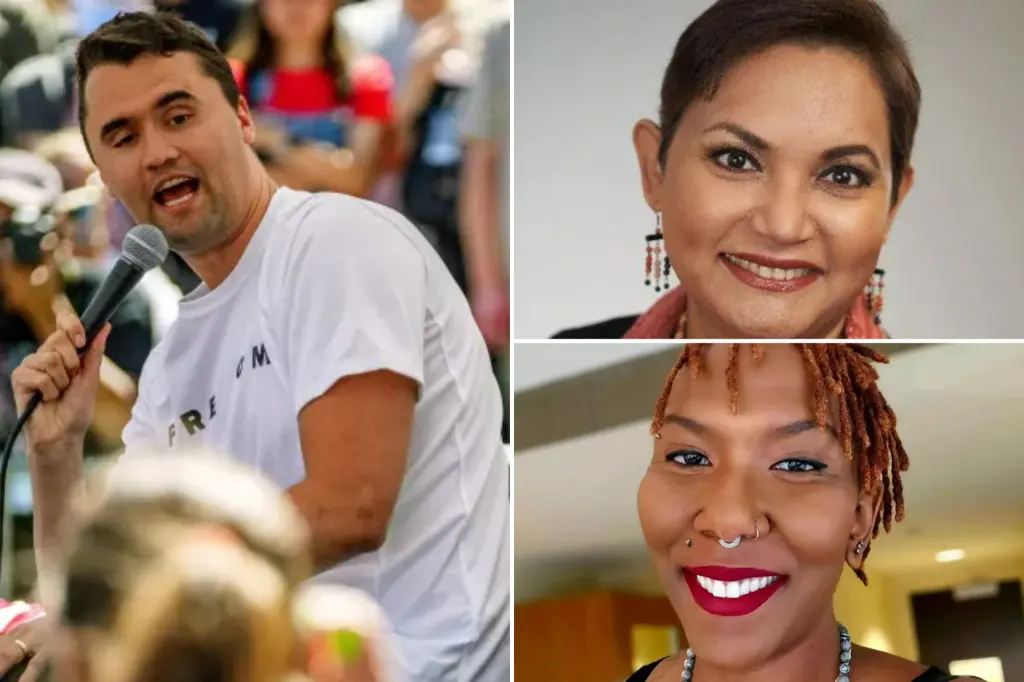
Shortly after Eric Adams won the Democratic primary for mayor of New York City in 2021, he texted his former lover, Jasmine Ray, and urgently asked her to meet him.
“I’m going to be mayor of New York City, and I don’t want to do this without you,” he wrote, in a message Ms. Ray recounted in a self-published book to be released on Sunday.
She immediately drove from her home in Pennsylvania to her mother’s house on Staten Island and took a walk along the shore with the future mayor of New York City. They excitedly discussed ideas for his mayoralty, she said.
A year later, he appointed her as the city’s first director of the Mayor’s Office of Sports, Wellness and Recreation, a $160,000-a-year job created by the City Council months before he took office.
Ms. Ray, 42, worked for the city for nearly three years until her resignation took effect on Friday, two days before Mr. Adams, 65, exited the mayor’s race.
The couple said they never revived their decade-old relationship. Still, her proximity to the mayor led to her being interviewed by federal prosecutors in his corruption case.
The mayor, who has long described another woman, Tracey Collins, as his life partner, never spoke of his relationship with Ms. Ray, who also dated others. She too kept their romance confidential.
That secrecy is ending this week, with Ms. Ray announcing the imminent release of “Political Humanity: A Memoir of Love, Legacy and New York City Politics.” The book, which Ms. Ray shared with The New York Times, reads as an ardent love letter to the outgoing mayor and represents yet another chapter in the singular and colorful story of Eric Adams.
It is also a broadside against the media that covered him and the Black New Yorkers who ultimately abandoned him after he was indicted on bribery and fraud charges — a case that she derided as being politically motivated.
The book offers a personal glimpse into what Ms. Ray characterizes as Mr. Adams’s thinking during the tumultuous four years of his administration. And it sheds light on his murky, complicated love life.
A spokeswoman for Mr. Adams declined to comment.
Ms. Ray started writing the book during the pandemic, and said she shared portions of it with the mayor. His reaction, after reading the finished memoir on Tuesday, was “mixed,” Ms. Ray said. But she said he appreciated the portions that engaged with the generational trauma wrought by slavery, which Ms. Ray argued makes Black New Yorkers more likely to tear down one of their own.
Ms. Ray said Mr. Adams spent years discouraging her from publishing the book, worrying it would hurt his career. She decided to release it once the polls made it clear that he would not be re-elected.
“He could sit still for hours if I kept my hand there, as if my touch eased something no one else could reach,” she wrote.
Ms. Ray, who has two children, hails from a storied Brooklyn family. Her great-grandfather, the Rev. Dr. Sandy F. Ray, was a prominent civil rights leader who was so close to Martin Luther King Jr., that when Dr. King was stabbed in 1958, he recuperated at Dr. Ray’s parsonage. “You know, for years he was ‘Uncle Sandy’ to me,” Dr. King once said. “In fact, I did not know he was not related to me by blood until I was 12 years old.”
Ms. Ray grew up bouncing among Brooklyn, Staten Island and North Carolina, steeped in her great-grandfather’s legacy and grappling with the premature death of her teenage brother. She discovered a talent for sports, earning a fourth-degree black belt in karate and founding in her brother’s honor the U.S. Wallball Association, an organization that was devoted to the decidedly New York City sport of handball. Her background became useful at City Hall, where her job included organizing youth sports competitions.
She met Mr. Adams, then the Brooklyn borough president, at a 2014 Brooklyn Nets game at Barclays Center, and was charmed by the man in the “brown Mr. Rogers sweater,” sporting the “warmest smile” she had ever seen.
They began to see each other regularly, eventually becoming intimately involved the next year after attending a gala in the Bronx.
But in 2016, he summoned her to Brooklyn Borough Hall and told her that he needed space and that they had to end their relationship. The conversation devastated Ms. Ray.
“You just want to believe that someone cared, you know?” she said in the interview.
They remained friends. And after they reconnected in 2021, they tried to rekindle their romance. But, Ms. Ray said, “the spark was gone.”
On their 2021 walk along the Staten Island boardwalk, she recalled the way Mr. Adams noted with excitement that former Mayor Michael R. Bloomberg had taken him under his wing.
“He was like, Bloomberg, Bloomberg, Bloomberg,” Ms. Ray said on Wednesday, speaking near the Midland Beach shoreline where she once walked with the mayor. “And I was like, yes, Bloomberg is amazing.”
Twice last year, Ms. Ray said she told the mayor she wanted him to talk with her about their relationship in the hopes of getting closure, only for the mayor to say, “Not now, there’s a lot going on.”
In her writing, and in the interview, Ms. Ray expressed conflicting feelings about Mr. Adams’s mayoralty. She described him as both a talented leader — even a “visionary” — and also as someone with a chip on his shoulder who is unwilling to admit his own mistakes.
Ms. Ray traces the origins of Mr. Adams’s insecurity to his undiagnosed childhood dyslexia, which left him feeling intellectually inferior in class, and described him as a “damaged child.”
“He actually said, ‘I have the chip on my shoulder,’” Ms. Ray said. “‘I really want to not have this chip on my shoulder.’ And I said, ‘Well, you’re the only one that can make that decision.’”
The book seeks to absolve Mr. Adams of the most serious charges against him and seems to channel Mr. Adams when it argues that Black New Yorkers held one of their own to an impossible double standard.
After Mr. Adams was indicted a year ago, and then curried favor with President Trump in pursuit of the eventually successful dismissal of his case, several Black leaders, including Andrea Stewart-Cousins, the majority leader of the New York State Senate, and Adrienne Adams, the speaker of the New York City Council, called for Mr. Adams to resign.
Mr. Adams was “disappointed and hurt,” Ms. Ray said in the interview.
“So why is it that when Cuomo steps into the arena, he’s met with solidarity and second chances, but when Eric does, the reaction is often skepticism and dismissal?” Ms. Ray wrote, referring to Andrew M. Cuomo, the former governor who resigned in disgrace amid sexual harassment allegations that he continues to deny.
After Mr. Adams was indicted last September, Ms. Ray was subpoenaed and testified twice before a grand jury. Prosecutors later said they had been preparing new charges against the mayor related to obstruction of justice.
Ms. Ray said in the interview that the experience left her racked with anxiety and confused about her connection with the case.
She said the questions she was asked before the grand jury “were very specific to my relationship with Eric. It was not about criminality.”
She said that as the federal investigation of Mr. Adams unfurled, she asked herself: “Is he the right person for the job? Did he make the right decisions?”



